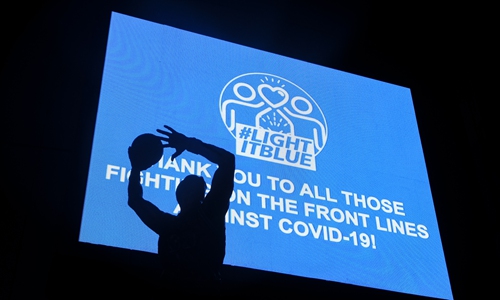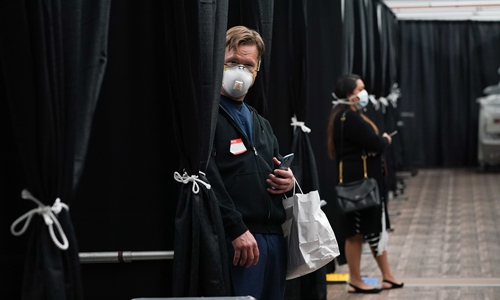Only wartime status against virus can save the US: experts
Federal govt far from mobilizing entire society

Staples Center is lit up with blue light at 8 pm Thursday night as part of the #LightItBlue campaign in the US in honor of healthcare workers and others on the frontline of the coronavirus pandemic. Landmarks across the US were illuminated in blue Thursday night. Photo: cnsphoto
The US, which is supposed to be exceeding the rest of the world regarding healthcare resources, medical technology and intelligence capabilities, was witness to two "firsts" over the weekend - it ranked first in reported coronavirus fatalities and all 50 states for the first time declared disasters due to the COVID-19 pandemic on Saturday.
The outbreak is exploding in the US, observers believe. Even worse, they warned it's too difficult for the country to turn back the tide before it officially declares a "wartime state" on the pandemic, or any other attempts to mobilize the entire country.
As of press time, the US has reported over 530,000 cases of coronavirus with more than 20,600 deaths, according to Johns Hopkins University's statistics. New York State alone has more cases than any other country outside the US, with more than 181,000 infections as of Sunday. Yet experts still find it hard to predict when the peak would arrive in the US.
The response regarding Washington in the battle against the pandemic has its own people questioning the capabilities of US governance amid the crisis, analysts noted.
Surprisingly late decisions
The first case of coronavirus in the US was announced on January 21. It took only a mere two months before the US overtook China to become the country with the most confirmed cases worldwide on March 26. Five days later, the coronavirus death toll in the US surpassed China.

People wearing face masks stand in a temporary field hospital for COVID-19 patients under construction at the USTA Billie Jean King national tennis center in the Borough of Queens on Wednesday in New York. Photo: AFP
Yet during this period, US President Donald Trump had been constantly suggesting that the virus was nothing more than a conventional flu and when US politicians were busy pinning the whole blame on China, a viral smear campaign emerged attacking China's political system and questioning the lockdown of Wuhan, a city hit hardest by the virus in China, which they deemed as useless and triggering a humanitarian crisis.
On March 24, Trump still rejected any comparison between the current COVID-19 pandemic and the 1918-19 pandemic, articulating "you can't compare this to 1918."
When the top leader of the US federal government makes statements like that, it's only natural for the public to let their guard down, Xin Qiang, deputy director of the Center for American Studies at Fudan University in Shanghai, told the Global Times on Sunday.
Nicole Wang, a Chinese student studying at Johns Hopkins University said quite a few locals have been jogging, walking dogs and gathering without wearing masks in early April.
US culture advocates for individual freedoms and people have little intention of sacrificing individual freedom for the greater good, Xu Liang, a visiting scholar at the University of Iowa, told the Global Times on Sunday.
Americans have no money-saving tradition, observers said, noting if social distancing is implemented, including taking pauses on economic activities, many blue collar workers would be out of jobs, losing incomes or even insurance. That's why measures haven't been carried out efficiently, they explained.
That's also why even after Bruce Aylward, head of the WHO Experts Advance Team who visited China in early February, shared the vital lesson he has learned from China in containing COVID-19 after his tour in Wuhan, emphasizing that it is all about speed. The suggestion was confronted with a cold shoulder by the US, with US politicians' inaction and disregard forcollectivism in US society.
The declaration of a "major disaster" means now that US states can get access to relevant federal funding to prevent higher potential risks, Chen Xi, an assistant professor of public health at Yale University, told the Global Times on Sunday. While observers affirmed it was a right move, they also noted it has come "surprisingly" late.
This is also the case with promotion of coronavirus testing in the US. On April 2, USA Today reported the country is testing 100,000 people each day for coronavirus. Yet Dena Grayson, a US infectious disease expert, tweeted on Wednesday, saying the US is conducting the tests after "all too many Americans are dead."
"The federal government has continually been playing 'catch up' with the disease," William Jones Washington bureau chief of Virginia-based weekly news magazine Executive Intelligence Review, told the Global Times on Sunday. He added there should have been calls for masks from the beginning, as there was in Hubei, but many more people had to die before this was fully understood although Chinese doctors had been urging this from the beginning.
The US is "on course to see more of its citizens die than in the wars of Korea, Vietnam, Afghanistan and Iraq combined," wrote The Washington Post on April 4.
Inability to right wrongs
Part of China's experience in handling the early stages of the outbreak in Wuhan seen local authorities in Hubei come up with a delayed response to the epidemic, the central government quickly intervened in the matter and adjusted the policy in dealing with it in a quicker and more decisive way.
The Communist Party of China's top discipline authority urged strict law enforcement in the COVID-19 battle, and officials who fail to fulfill their duties will be held accountable. More efforts have been made to correct bureaucracy and formalism in Wuhan and Hubei as a whole.
The US needs to learn from China's experiences of correcting its misteps in time and "correcting the formalism of its so-called democracy and liberalism, which won't help solve the coronavirus crisis," Shen Yi, director at the Research Center for Cyberspace Governance of Fudan University, told the Global Times on Sunday.
Divergence in decision-making systems has played a crucial role in the US' inefficient response to the pandemic, observers noted. As the virus was rapidly spreading across the country, the White House Office of Management and Budget and officials from US healthcare sectors are arguing back and forth over budgets to be pooled for combating the coronavirus.
"White House budget hawks argued that appropriating too much money [in late January and early February]… would be viewed as alarmist," the Washington Post wrote. Such political constraints and struggles also prevailed over the realistic needs of saving lives, experts said.
In a report released on April 2, the House Committee on Oversight and Reform noted it was informed by the Federal Emergency Management Agency (FEMA) that the country is running out of ventilators. Although Trump vowed by the end of March that the US would manufacture or procure an additional 100,000 ventilators, FEMA underscored the bulk of them will not be available until late June at the earliest.
Relying on a vaccine is another problem the US needs to address, observers said. As the US continues to claim the country is ramping up development of a vaccine and touting anti-malaria drugs as potential treatment for COVID-19, without solid proof of their efficiency, the imaginary vaccine and unproved drugs will hardly help the US flatten the curve of infections now, experts said.
The point is: will the US make a timely correction like China in extremely time sensitive conditions?, analysts asked.
The US, which exploited the death of the late Chinese ophthalmologist Li Wenliang to criticize China's efforts in the coronavirus fight, who was later awarded an advanced individual title and designated as martyr, tend to turn a blind eye to how the US deals with their own whistleblowers, including the USS Theodore Roosevelt captain, who was fired for raising the alarm of a viral outbreak aboard the top US battleship.
More than 10 percent of the crew from the aircraft carrier have tested positive for the coronavirus, the US Navy said on Saturday.
Need for declaring wartime status
Coronavirus is the US' common enemy, but all 50 states are not fighting on the same team thanks to the US political system in which each state has its own administrative legislation, judicial system and policies on coronavirus control, experts warned.
Each state, even each politician, tends to prioritize their own political interests, and they would therefore put economic performance as their first priority, Xin said.
According to Jones, the biggest problem was also the failure to place the solution in federal hands to begin with, and relied on the states to resolve much of the problem themselves, "for which they did not have the means," Jones said.
Unless the US places itself under a serious "wartime status" against the virus, the country will hardly turn the tables on its deteriorating coronavirus situation, Xu said.
The view is echoed by many other observers, who noted the US needs a strong and powerful central government to mobilize the entirety of society amid a time of crisis, while pointing out the current US administration, which is immersed by individual struggles, or a single party's own interests, is accelerating political polarization.
Declaring wartime status might change the situation, Xin said, since it may boost the US federal government's capability to pool medical resources, demand relevant enterprises to switch or expand the production of medical supplies, allocate emergency funds to import related materials and set rules on relevant prices.
Yet it still doesn't seem possible now and it looks like it will be a long journey before the country can unify its political parties and entire US society, Xin noted.
Trump will hardly go further, Jones said. He and the Republican Party would not want to lose most of their present supporters, some of whom are calling for "opening up of the country," referring to Trump's plans that are expected to be announced on Tuesday regarding economic recovery, despite the possible casualties, he said.
